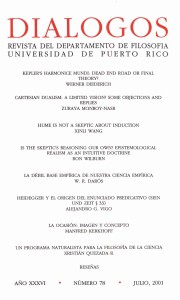Abstract
In the Discourse1 Part V, Descartes gives some empirical reasons against the possibility of explaining thought and language in mechanistic terms. In the light of the development of neuroscience, these arguments have led to some contemporary interpretations of Cartesian dualism which suggest that it was motivated by limitations in Descartes' mechanistic conception of physics. Some recent scholars maintain that
Descartes was not able to see how the brain or the nervous system could generate all the complex responses necessary for the production of
thought and language. As a consequence, Descartes remained a dualist.

This work is licensed under a Creative Commons Attribution-NonCommercial 4.0 International License.
Downloads
Download data is not yet available.

